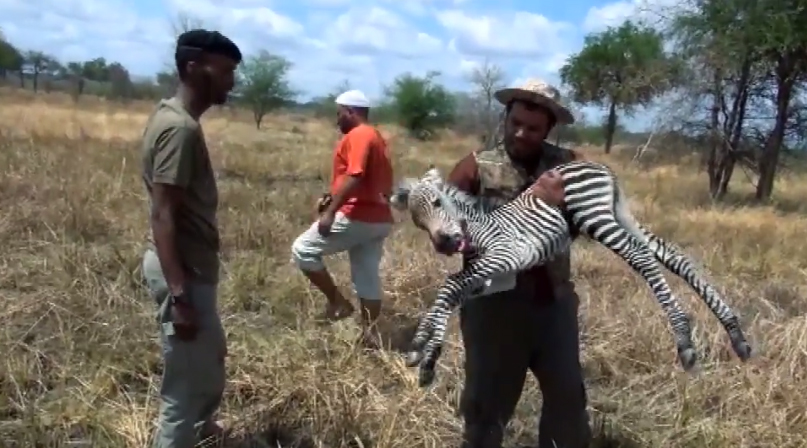
A year after the killing of Cecil the lion by a wealthy American dentist prompted revulsion and condemnation around the world, trophy hunting in Africa is again in the news, with the Tanzanian government accused of leasing land to a disgraced safari company backed by a ultra rich member of Abu Dhabi’s royal family, for the purposes of hunting.
The company, Green Mile Safari, had all its licenses revoked by the Tanzanian government two years ago after disgusting videos surfaced revealing graphic wildlife abuses by hunters who had engaged the company’s services.
Seemingly made in 2012 to promote Green Mile’s offering, and leaked in 2014, the deeply upsetting footage features various violations of Tanzanian laws including hunting with automatic weapons, children using automatic weapons, shooting down fleeing animals from moving cars, running over animals with cars, capturing baby animals, torturing dying animals, and using bait and lights at night to attract animals.
The company claim they were sabotaged by a rival group, who sent an employee to stage and film the awful scenes without their knowledge. ‘We cannot deny that we see some of our tourists in that video, but what happened is something…we were also shocked,’ Green Mile advisor Yahya Kishashu told Quartz. ‘The video was cleverly planted by our business rivals.’
However, critics question this, pointing out that the extensive videos seem to promote the company, and the legend appears on one video reading, in Arabic, ‘snapshots from our third group trip vacation’. A child who appears in the videos was also pictured holding a dead baboon in a photo on Green Mile’s now-shuttered website (which was preserved by the Internet Archive).
In the furore that followed the release of the video, Green Mile—which is joint owned by wealthy Tanzanian Awadh Ally Abdallah and Sheikh Abdullah bin Butti Al Hamed, a member of Abu Dhabi’s ruling family and government official—was effectively banned from operating in Tanzania.
But now, just 24 months later, they’re back, having apparently been given a concession to operate on a wildlife-rich piece of land around Lake Natron. This is especially controversial, because new video evidence of animal abuse by Green Mile clients has emerged, published by the news site Quartz and obtained via WildLeaks, a initiative of the Elephant Action League that facilitates whistleblowing within the world of conservation.
In impoverished Tanzania, it’s not uncommon for blocks of land to be leased by wealthy foreign companies for the purposes of hunting. These operators, however, are bound to observe hunting laws and restrictions (the ones horrifically flouted by Green Mile clients in the video footage). They’re also expected to invest in anti-poaching patrols and contribute to the improvement of basic local infrastructure, although many environmentalists and critics claim this is the exception rather than the rule.
One company that has, on the face of it, fulfilled some of its obligations is the US-based Friedkin Conservation Fund, a trust created by a super-rich Texan family and headed by Daniel Friedkin, son of racing-car driver and passionate game hunter Thomas Friedkin, who became a billionaire by importing Japanese cars into the American South.
Besides building camps and running hunting safaris, the Friedkin Conservation Fund has apparently invested $300 million in the last 25 years, fighting poachers and helping local villages. The trust hit headlines in January this year when Roger Gower, a 37-year-old former accountant from Britain who was flying anti-poaching helicopter missions for the Friedkin Fund was fatally shot while tracking criminals who had killed three elephants near the Serengeti national park.
In February, four men accused of killing Gower were jailed for 15 years, but friends of the Brit and other environmentalists have complained that the Tanzanian government has wilfully avoided the bigger picture, involving corrupt officials, foreign gangs and organised poaching. Factors such as the ban imposed on lion researcher and conservationist Craig Packer from entering country have led some to accuse the government of complicity in illegal hunting.
Then, in May, a subsidiary of the Friedkin Conservation Fund, Wengert Windrose Safaris (WWS), was told they were being evicted from their Lake Natron hunting block, and the letter informing them of this revealed that the new lease-holders were none other than Green Mile Safari. The politics behind this decision are intricate and murky, but the move has been greeted with despair and fury by international conservation and anti-cruelty groups, and by many in the country itself.
Such is the scale of the scandal, that it threatens to tarnish the reputation of John Magufuli, Tanzania’s recently elected president and an anti-corruption voice within the long-ruling Chama Cha Mapinduzi party (CCM). ‘The whole Green Mile scandal from being ordered out of the country [to being] favored to get blocks they didn’t bid in open tender, to impunity they have shown, shows how corrupt the CCM-state system is,’ Zitto Kabwe, a member of the Tanzanian parliament who belongs to the opposition party told Quartz.
For many, the affair underlines the fact that the model of having blocks of land put aside for rich overseas hunting safaris is a deeply flawed one. ‘For one hunting concession that manages to do anti-poaching, there are many others that don’t care,’ says Andrea Crosta, the executive director of the Elephant Action League. ‘Tanzania, South Africa, Mozambique, places where trophy hunting is allowed, are all countries with serious poaching problems. In Kenya there is no trophy hunting, and the situation is much, much better than Tanzania.’

